Batchelor Surname Ancestry ResultsOur indexes 1000-1999 include entries for the spelling 'batchelor'. In the period you have requested, we have the following 665 records (displaying 501 to 510): Single Surname Subscription | | | Buying all 665 results of this search individually would cost £3,896.00. But you can have free access to all 665 records for a year, to view, to save and print, for £100. Save £3,796.00. More... |
These sample scans are from the original record. You will get scans of the full pages or articles where the surname you searched for has been found. Your web browser may prevent the sample windows from opening; in this case please change your browser settings to allow pop-up windows from this site. Soldiers' Balances Unclaimed
(1897)
The War Office, under 'The Regimental Debts Act, 1893' compiled and published lists of names of deceased soldiers whose personal estate was held by the Secretary of State for War for distribution amongst the Next of Kin or others entitled. These lists give full name (surname first), rank, regiment, and the amount of the estate unclaimed. During 1897 new lists CCXCI to CCC relating to recent deaths, estates 1896-1897, were issued, as well as republications of lists CCXLI to CCXC from previous years (estates 1891-1896) showing details of balances still remaining unclaimed.
BATCHELOR. Cost: £6.00.  | Sample scan, click to enlarge

| Merchants and traders in Newcastle-upon-Tyne
(1515-1898)
The society of Merchant Adventurers of Newcastle-upon-Tyne consisted of those who had obtained freedom of the city (allowing them to trade there) by birth as a son of, or apprenticeship, to a freeman: and within that, freedom of one of the three 'trades', i. e. boothman, draper or mercer. F. W. Dendy prepared extracts from the merchant adventurers' records, the second volume, published by the Surtees Society in 1899 containing extracts from the minute books relating to the history of the merchants' court, an account of the long-standing dispute between the Newcastle company and the London company, some extracts relating to the relations between the Newcastle company and the Eastland Company (who had a monopoly of the trade with Russia and the Baltic), copies of the oaths used by the Newcastle company, the London company and the Eastland Company, and (pages 185 to 381) a list of the apprentices enrolled in, and of the freemen admitted to, the Newcastle company. This list is arranged in a table of seven columns: Name of Apprentice; Name of Father of Apprentice and Observations (particularly, instances where an apprentice is passed over to a new master during his apprenticeship); Master; Boothman (B.), Draper (D.) or Mercer (M.); Date of Indentures: Enrolment: Admission. All the dates are normalised to New Style, i. e. to the modern calendar. Finally, there is a list of sons and apprentices of members who, having thus acquired the right of freedom of the city, took up the freedom, but did not assume the freedom of any of the three trades. The index covers all the contents of the volume, not just the apprentice and freemen lists.BATCHELOR. Cost: £4.00.  | Sample scan, click to enlarge

| Boys entering Brighton College
(1898)
This edition of the Brighton College Register was published in 1922. The plan of the publication was to list boys by year or, later, term of entry. Each name is assigned a sequential number, 5000 boys, in all, being recorded. Full name is given (surname first, in bold); year of birth; year of leaving; and then (wherever the compiler had such information) a short biography, ending with date of death, where known.BATCHELOR. Cost: £4.00.  | Sample scan, click to enlarge
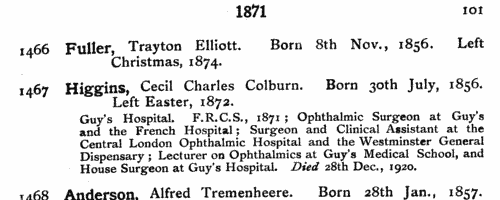
| Officers of the Royal Navy and the Royal Marines
(1898)
The Navy List, published by Authority, corrected to 18 December 1898, has this list of the officers on the Active List of the Royal Navy and the Royal Marines. Each officer's surname, christian name, and any middle initial(s) is given; with rank, date of seniority in that rank, and 'where serving', the last being the number of his ship. The ranks are: A, Admiral; A E, Assistant Engineer; A F, Admiral of the Fleet; A P, Assistant Paymaster; Art E, Artificer Engineer; As Ck, Assistant Clerk; B, Boatswain; Bandr, Bandmaster Royal Marines; C, Captain; Car, Carpenter; Ch, Chaplain; Ch B, Chief Boatswain; Ch Cr, Chief Carpenter; Ch E, Chief Engineer; Ch Gr, Chief Gunner; Ch P; Paymaster-in-Chief; Ck, Clerk; Cr, Commander; D I H, Deputy Inspector-General of Hospitals and Fleets; E, Engineer; E Ins, Inspector of Machinery; F E, Fleet Engineer; F P, Fleet Paymaster; F S, Fleet Surgeon; Gr, Gunner; H Sch, Head Schoolmaster; I H, Inspector-General of Hospitals and Fleets; L, Lieutenant; Mid, Midshipman; N C, Naval Cadet; N I, Naval Instructor; P, Paymaster; R A, Rear Admiral; S, Surgeon; S C, Staff-Captain; S Cr, Staff Commander; S E, Staff Engineer; S L, Sub-Lieutenant; S P, Staff Paymaster; S S, Staff Surgeon; Schm, Schoolmaster Royal Marines; St Ma, Sergeant Major Royal Marines; V A, Vice Admiral; W O, Warrant Officer Royal Marines. The column 'Where serving' also may have these abbreviations: AdC, Aide-de-Camp to the Queen; AO, Clerk to Secretary to a Flag Officer; CG, Coast Guard; CGP, Coast Guard Pension; DY, Dock Yard; GH, Greenwich Hospital; GHP, Greenwich Hospital Pension; GSP, Good Service Pension; NH, Naval Hospital; NID, Naval Intelligence Department; NP, Naval Pension (late Out-Pension of Greenwich Hospital); PW, Pension for Wounds; Sec, Secretary to a Flag Officer; TP, Travers Pension; TS, In the Transport Service; VY, Victualling Yard.
BATCHELOR. Cost: £6.00.  | Sample scan, click to enlarge
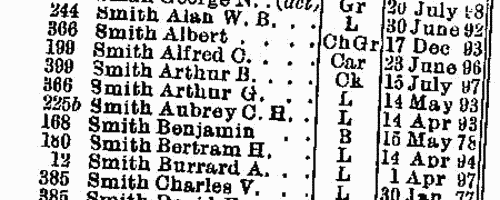
| Boys at University College School
(1860-1900)
In 1830 a school was set up adjoining the University and College of London on Gower Street; the school was enlarged from 1860 to 1876, and then removed to Frognal in 1907. In 1931 this register was published, listing all boys entering the school from Christmas term of 1859 to the summer entrants of 1931. The dates are abbreviated (98-01 = 1898-1901, &c.), each session being reckoned as beginning in September of one year and ending in the July of the next; the date of joining the school is indicated by the former, although it may fall in the latter, but the date of leaving by the latter, although it may fall in the former. Thus, if a boy came at any time during the Session 1863-64 and left any time during 1868-69, his date would be given 1863-69. The boys are listed alphabetically by surname, and then chronologically under each surname, full name being given where known. An asterisk * indicates that that particular boy lost his life in the Great War: in these cases, rank and regiment have been given where possible. Addresses as of 1931 are given where known. Italics in christian names or initials indicate that that particular boy was known, in 1931, to be dead. (a) (b) &c placed before christian names indicates brothers. In some cases occupation in later life is shown (A, artist; B, barrister; C A, chartered accountant; Ch, chemist; E, engineer; H C S, home civil service; I C S, Indian civil service; Med, physician or surgeon; M S E, member of the Stock Exchange; Mus, musician; Rev, minister of religion; S, solicitor). This is the index to those boys who were at the school in the period 1860 to 1900.BATCHELOR. Cost: £4.00.  | Sample scan, click to enlarge

| Boys entering Uppingham School
(1900)
The public school at Uppingham in Rutland was founded by Archdeacon Johnson in 1584. A roll of scholars from 1824 to 1905 was edited by J. P. Graham, and published in 1906. This was a revision and updating of an 1894 edition of the roll, the great bulk of the work having been done by Mrs Mullins. The roll is arranged by year, and within each year by term of entrance, and then alphabetically by surname within each term. Each boy's name is given, surname first, with an asterisk where known (in 1906) to have died. Then there is month and year of birth, father's name (most often just surname and initials) and address (at entrance). Where the boy represented the school at Rugby football (XV) or cricket (XI), that is indicated. After the month and year of leaving the school, there is a brief summary of achievements in later life, and, where known, address as in 1906; but as late as this year, most boys were still at school and the entries are brief. From 1875 onwards the house within the school is also noted, with these abbreviations: A., Mr Constable's House; B., Brooklands; C., West Bank; E., Mr J. Gale Thring's House; F., Fircroft; Fgh., Farleigh; H., Highfield; L., The Lodge; L. H., Lorne House; M., Meadhurst; N., The Hall; R., Redgate; R. H., Red House; S., School House; and W. D., West Deyne.BATCHELOR. Cost: £4.00.  | Sample scan, click to enlarge
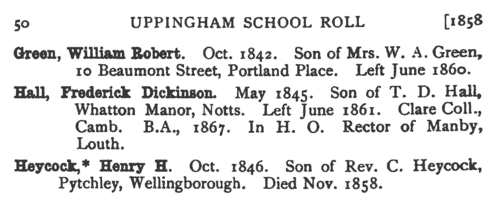
| Eton College boys and masters
(1900)
Printed lists of boys attending Eton College were issued each School-Time or term. This is the list for Lent School-Time, 1900. The governors and masters of the schools are given first: then the names of a scholar elected for King's in December 1899, and the names and ages of 16 scholars elected for Eton in July 1899, 12 of whom had been admitted. Winners of the Newcastle Scholarship, two each year, back to 1829 (here indexed from 1859 onwards), and of the various college scholarships and prizes for 1899, precede the Distinctions in Trials (examinations) for December 1899. The First Hundred and Certificate examination list for Election 1899 list the boys in order of merit and with the marks awarded in Classics, Mathematics, Scripture Knowledge and History. The Certificate list is divided into First, Second and Third Classes, Passed, and Failed. The names of examiners and absentees are also given. Then follow the main lists of all the pupils, arranged by class. For every boy his position in class, surname, house tutor's name and classical tutor's name, are given; and evey boy's entry is annotated with details of his prizes during his whole period at the school. In the fifth forms the list for each class is divided into four parts, divided by a dotted line, then a wavy line, and then a full line. The top fourth had all obtained distinction in the last trials; those above the wavy line had been classed in the last trials; next were the unclassed; and below the full line were those boys who had failed in the trials.
BATCHELOR. Cost: £6.00.  | Sample scan, click to enlarge
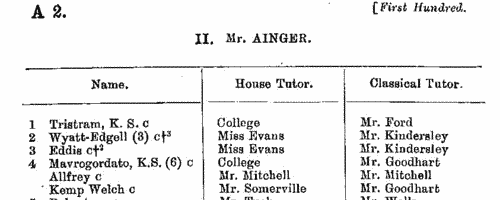
| Eton College boys and masters
(1900)
Printed lists of boys attending Eton College were issued each School-Time or term. This is the list for Midsummer School-Time, 1900. The governors and masters of the schools are given first: then the names of a scholar elected for King's in December 1899, and the names and ages of 16 scholars elected for Eton in July 1899, 15 of whom had been admitted. Winners of the Newcastle Scholarship, two each year, back to 1829, and of the various college scholarships and prizes for 1899 and 1900, precede the Distinctions in Trials (examinations) for March 1900. The First Hundred and Certificate examination list for Election 1899 list the boys in order of merit and with the marks awarded in Classics, Mathematics, Scripture Knowledge and History. The Certificate list is divided into First, Second and Third Classes, Passed, and Failed. The names of examiners and absentees are also given. Then follow the main lists of all the pupils, arranged by class. For every boy his position in class, surname, house tutor's name and classical tutor's name, are given; and evey boy's entry is annotated with details of his prizes during his whole period at the school. In the fifth forms the list for each class is divided into four parts, divided by a dotted line, then a wavy line, and then a full line. The top fourth had all obtained distinction in the last trials; those above the wavy line had been classed in the last trials; next were the unclassed; and below the full line were those boys who had failed in the trials.
BATCHELOR. Cost: £6.00.  | Sample scan, click to enlarge
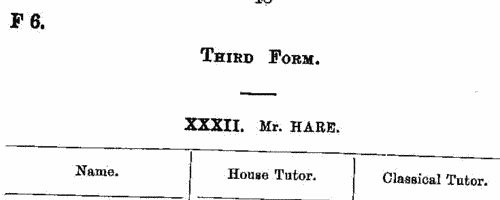
| Eton College boys and masters
(1900)
Printed lists of boys attending Eton College were issued each School-Time or term. This is the list for Michaelmas School-Time, 1900. The governors and masters of the schools are given first: then the names of a scholar elected for King's in December 1899, and the names and ages of 20 scholars elected for Eton in July 1900, 12 of whom had been admitted. Winners of the Newcastle Scholarship, two each year, back to 1829, and of the various college scholarships and prizes for 1899, precede the Distinctions in Trials (examinations) for July 1900. The First Hundred and Certificate examination list for Election 1900 list the boys in order of merit and with the marks awarded in Classics, Mathematics, Scripture Knowledge and History. The Certificate list is divided into First, Second and Third Classes, Passed, and Failed. The names of examiners and absentees are also given. Then follow the main lists of all the pupils, arranged by class. For every boy his position in class, surname, house tutor's name and classical tutor's name, are given; and evey boy's entry is annotated with details of his prizes during his whole period at the school. In the fifth forms the list for each class is divided into four parts, divided by a dotted line, then a wavy line, and then a full line. The top fourth had all obtained distinction in the last trials; those above the wavy line had been classed in the last trials; next were the unclassed; and below the full line were those boys who had failed in the trials.
BATCHELOR. Cost: £6.00.  | Sample scan, click to enlarge
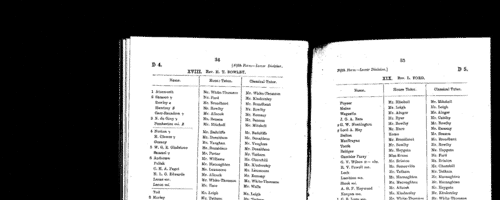
| Long-Lost Relatives: Answers to Inquiries
(1900)
Each issue of Lloyd's Weekly News, of London, contained a column devoted to searches for Long-Lost Relatives. The inquiries were arranged in three groups: Home Inquiries (i. e., from correspondents in the United Kingdom); Colonial and Foreign Inquiries (from abroad); and Soldiers' and Sailors' Inquiries. Results from all these were grouped together as 'Answers to Inquiries'.
Each column was headed: 'Correspondents MUST give full addresses and the DATES OF THE INQUIRIES to which they refer. We cannot search back numbers, nor print inquiries for "missing husbands." These columns are not intended for inquiries in respect to claimants for money, and no agents, at home or abroad, have any connection with Lloyd's.'BATCHELOR. Cost: £6.00.  | Sample scan, click to enlarge

|
Research your ancestry, family history, genealogy and one-name study by direct access to original records and archives indexed by surname.
|












